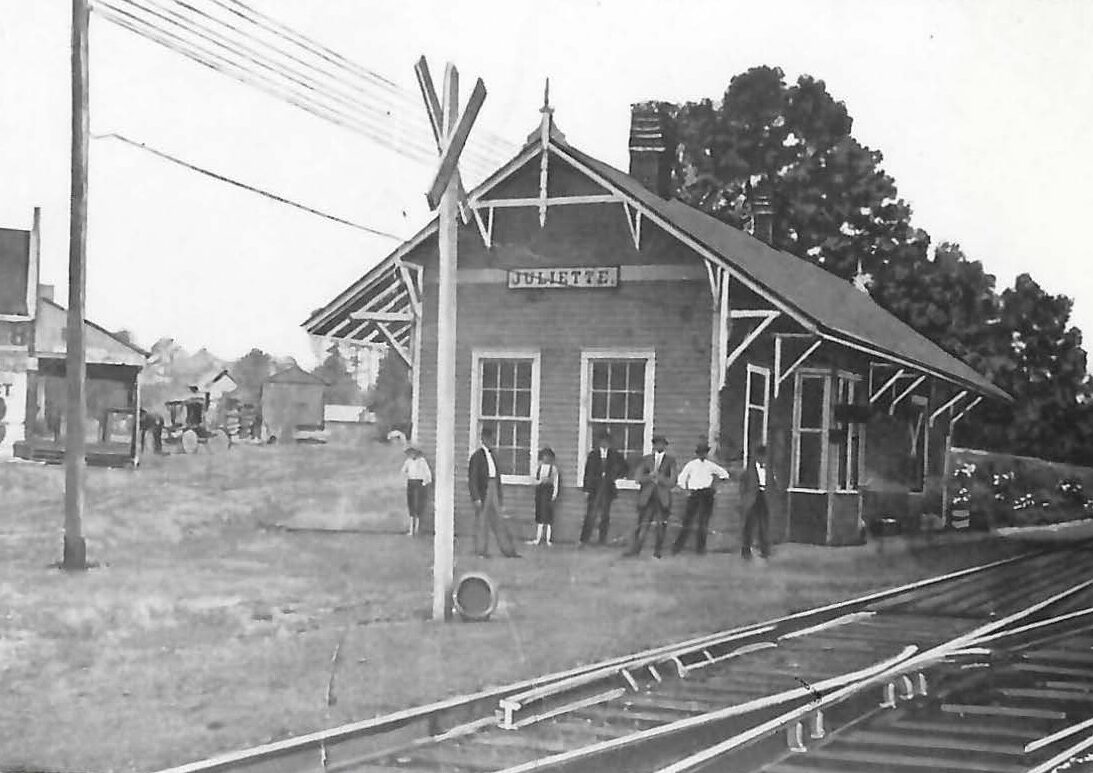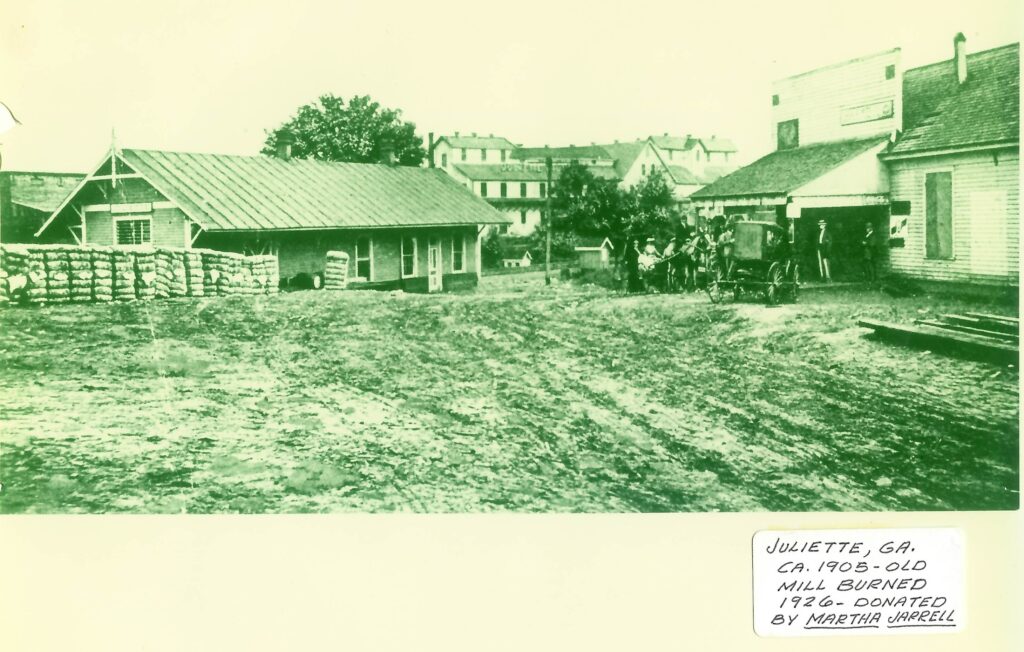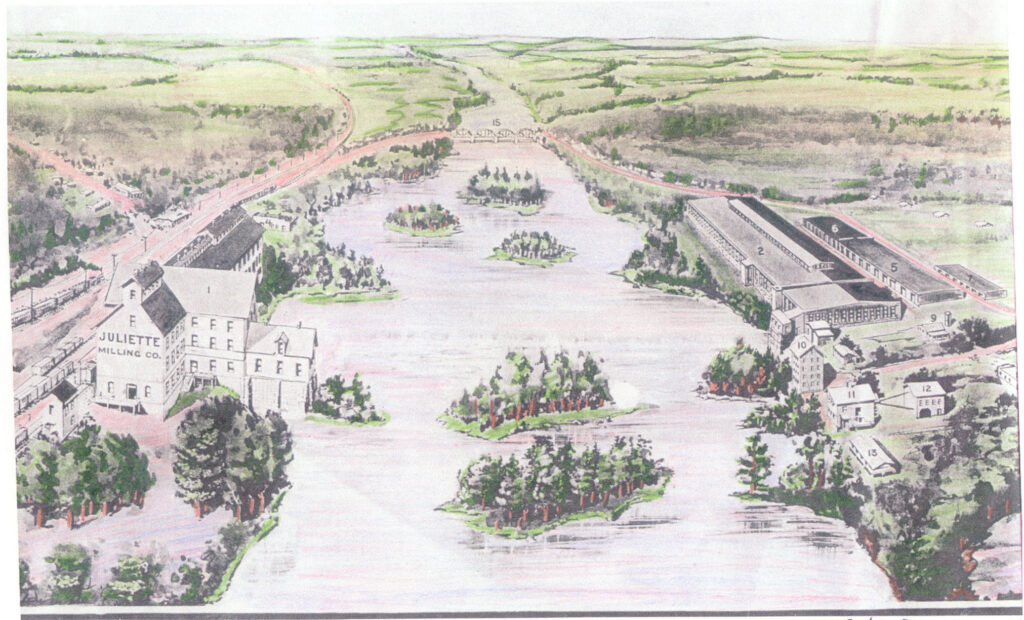Juliette and The Whistle Stop Cafe; Photo Credit: The Whistle Stop Cafe
If you’re stayin’ in Forsyth and have a couple hours, I highly encourage you to take Juliette Road over to the little town of Juliette. There’s somethin’ special about this little spot along the railroad tracks; with just one street it won’t take long to explore, but there’s a story here that’s worth gettin’ to know!
A Hollywood Scene…
For most folks, Juliette is the home of the Whistle Stop Cafe and its Hollywood-famous fried green tomatoes.
Back in ’91, producer/director Jon Avnet was looking for a location to film his adaption of Fannie Flagg’s Fried Green Tomatoes at the Whistle Stop Cafe. (Great book, if you haven’t read it! I believe it was a New York Times bestseller, and praised by Harper Lee herself!) Well, Avnet found his “Whistle Stop, Alabama” in a nearly deserted Juliette—dilapidated buildings just covered in kudzu, and sittin’ right off the railroad tracks… It needed some sprucin’ up, but could most definitely pass for a small 1930s rural town! (It once was one, after all.)
Still from Fried Green Tomatoes (1991); Photo Credit: Universal Pictures
The building that would become the renowned Whistle Stop Cafe was a grocery and hardware store back in the day. Redesigned as a cafe, with a horseshoe-shaped counter to allow for optimal camera angles, the building was positioned at the heart of the town as a focal point for the camera and as a symbol of its role in the Fried Green Tomatoes community.
We all credit Fried Green Tomatoes for bringin’ Juliette back to life and putting it on the map! Those opening scenes in the movie, showin’ “Whistle Stop” as a lifeless ghost town? They didn’t have to do much to Juliette for those scenes, they filmed it pretty much the way they found it. Like Whistle Stop in the movie, Juliette was once a bustlin’ little town full of community, but after the mill closed in ’57 and the train stopped stoppin’, businesses started closing and folks moved away. Now I can’t speak for any murder conspiracy, but the story of the community of “Whistle Stop” portrayed in the film isn’t far off from Juliette’s own story, and I for one appreciate that it’s a story that will now live on.
Still from Fried Green Tomatoes (1991); Photo Credit: Universal Pictures
Anyway, after the film, which starred such household names as Kathy Bates, Jessica Tandy, Mary Stuart Masterson and Mary-Louise Parker and was nominated for two Oscars, two BAFTAs and three Golden Globes, fans flocked to our Juliette. The movie folk had put everything back to the way they found it, mostly. They left the fake front buildings, but the depot (which had long ago been moved away from the tracks and left to decay in a field) was put back and the town more or less became a ghost town again.
Now, not everyone had abandoned sweet Juliette…a few still lingered nearby. Mr. Robert, who had inherited the building they used for the cafe from his family, the Williamses, saw an opportunity in all the new interest to bring Juliette back to its former glory, to preserve its heyday through the lens of “Whistle Stop.” He and his friend Jerrie Lynn turned the cafe building into a real cafe servin’—you guessed it!—fried green tomatoes and other classic favorites like fried chicken and barbecue. Other locals began renovating the town, building onto the backs of the fake movie fronts and opening shops. The depot was moved again to its present location behind the cafe. Eventually, we started the annual Fried Green Tomato Festival, and sometimes we even have country jam sessions in the movie set’s “Opry House!”
The Whistle Stop Cafe; Photo Credit: Explore Georgia
It was a smashin’ success, and to this day folks come from all over the world to see our Juliette!! Other films have been filmed in and near the town—a getaway scene from Baby Driver was shot just across the way on the Juliette Bridge, for example. But Fried Green Tomatoes will always be one and the same with Juliette’s legacy.
…Meets Rail Town Roots

Juliette Train Depot c. 1900; Photo Credit: Monroe County Historical Society Archives.
For as closely aligned as Juliette and Fried Green Tomatoes’ Whistle Stop are (lendin’ an aura of authenticity that I, for one, credit why the town still resonates with fans after more than thirty years!), they aren’t the same. Under the trappings of the fictional film set, there are real folk, real families who have called this little town home for generations—mine one of them. You might not be able to chat with Ruth and Idgie at the Whistle Stop Cafe, but you can with Ms. Liz, the cafe’s current owner. You can get to know Ms. Joann and Mr. Tommy from The Honeycomb, and Frankie Williams whose great-great-grandparents ran Juliette’s general store. A cast of real locals, with real stories to share, and I’d be remiss in tellin’ the story of Juliette if I didn’t introduce you to at least some of them!
Morgan and Annie Bridges; Photo Credit: The Newsom-Bridges Family
My grandaddy, Morgan Bridges, was a telegrapher for the railroad, working out of the Juliette Train Depot. He had a little desk tucked into that big bay window, lookin’ out over the tracks where he could see the trains comin’ and goin’. Grandaddy also owned a general store in nearby Berner run by my grandma Annie, and later a farm. I grew up listenin’ to stories of ferry crossings (in the days before the bridge), neighbors helpin’ neighbors survive the Depression, and even Grandaddy going head-to-head with the state when they wanted to build Highway 83 through his land (he made ’em build an underpass for his cows). Their stories helped paint a picture of life in Juliette and Berner as vivid as Fried Green Tomatoes’ Whistle Stop, only better because they really happened!

Juliette c. 1905; Photo Credit: Monroe County Historical Society Archives
Now Juliette wasn’t always called Juliette. First it was Glover, named for the man who built the town’s cotton mill. Our Juliette got a new name when the railroad came through in ’82 (that’s 1882) for Juliette McCracken, the railroad engineer’s daughter. The depot was built soon after, and even today you can’t miss the train that whistles through regularly, though its days of stoppin’ are over. Connecting Atlanta and Macon, the former Southern Railway had a larger-than-normal freight area at our depot due to the amount of business generated.

Juliette’s Mills, with the old bridge over the Ocmulgee River; Photo Credit: Maebell Napier
The mill was a large part of that business. There were actually two mills for quite some time: Dr. Glover’s cotton mill on one side of the river, servicing the local cotton growers, and Joe Smith’s grist mill on the other. Around 1900 Dr. Glover bought the gristmill from Joe Smith’s sons and consolidated the business into one company, the Juliette Milling Company. A log dam (later replaced in the 20s by the concrete one you see today and in the movie) powered the mills, and a thriving, mutually beneficial economy was established. Juliette was happenin’! A school was built, a church, and a bridge was added in ’07 to help commuters cross the river (the only bridge crossing the Ocmulgee for miles!). Before the bridge, Juliette had a ferry like other towns (does “Dames Ferry” ring any bells?). My grandaddy used to tell us stories about havin’ to stay in town when the river flooded and the ferry couldn’t run to take him and others home. He’d stay in a little house there on such nights, really a 10×10 room, with a small cot and a stove (and no bathroom). The bridge, which was the only river crossing for miles, was a significant sign of Juliette’s growing success.

Juliette’s old iron bridge over Ocmulgee River, c. 1924; Photo Credit: Monroe County Historical Society Archives
Other businesses began poppin’ up, too. One of the first, built just two years after the railroad came to service them and the mill, was the Williams’ general store. Yes, the same Williams I told y’all of earlier, though this wasn’t the cafe building! No, it was what is now the Opry House, and still owned by the family today. (Bet y’all thought the Opry was one of those fake fronts built just for the movie, huh?) By the 20s, many mom-and-pop shops were making a good living. The cafe building was built in ’27 by Edward Williams the elder as a general store sellin’ groceries and staples, gasoline, cattle feed, medication, clothing, even hardware. Ol’ Edward often said to folks, “We sell everything from the cradle to the grave!,” and that was pretty much so. His wife, Ms. Lillian, helped run the store and raised six children who all grew up helpin’ in the store. His was one of the last stores to do deliveries and allow customers credit, keeping a tab goin’. He closed the doors in ’72, after running that store for 45 years. The cafe still has items from the original store (and loads of movie memorabilia) if you have a hankerin’ to check it out!
Juliette Pre-Fried Green Tomatoes; Photo Credit: The Whistle Stop Cafe
After industries began to decline in the 50s, the community followed suit. The mill ceased all operations in ’57. The depot, no longer needed, was moved to a field and left to itself. One by one, Juliette’s merchants closed their doors. While some locals stayed in the area, finding work at the nearby power plant and in Forsyth, McCrackin Street slept for many years before being discovered and reawakened by Jon Avnet and his scouting crew in ’91. I will be forever grateful Mr. Robert saw a chance to keep the memories of Juliette alive through the lens of Fried Green Tomatoes. The sounds of train whistles, the clankin’ of the bridge, the roar of the water fallin’ over the dam, of frogs and crickets and children playin’ baseball games and swimmin’ in swimmin’ holes will live on. “Towanda!”
Juliette Bridge and the Ocmulgee River; Photo Credit: Explore Georgia
‘Til Next Time,
Your Storyteller
P.S. Y’all didn’t think that was the whole story, did’ya? For more history, visit the following pages and sites:
- The History of Juliette
- Whistle Stop Cafe – Our History
- History of East Juliette
- Towns of Jones County, GA – East Juliette
And for more movie-to-real-life comparisons, Jennifer at Road Trip Memories has a great blog post!
Sources:
Monroe County, Georgia A History. (1979). Monroe County Historical Society, Inc. Forsyth, Georgia Middlebrooks, Dianne. Middlebrooks researcher
“History of Jones Co., Ga” by Carolyn White Williams, Written by Alline Jarrell. http://files.usgwarchives.net/ga/jones/history/towns/juliette.txt
“Towns of Jones County, GA – East Juliette”, Copyright 2000 Virginia Crilley. https://sites.rootsweb.com/~gajones/juliette.htm
“The History of Juliette”, Copyright 2007 Fried Green Products. http://www.friedgreenproducts.com/juliettega/community/history.asp
“Our History”, Copyright 2024 The Whistle Stop Cafe. https://thewhistlestopcafe.com/history
